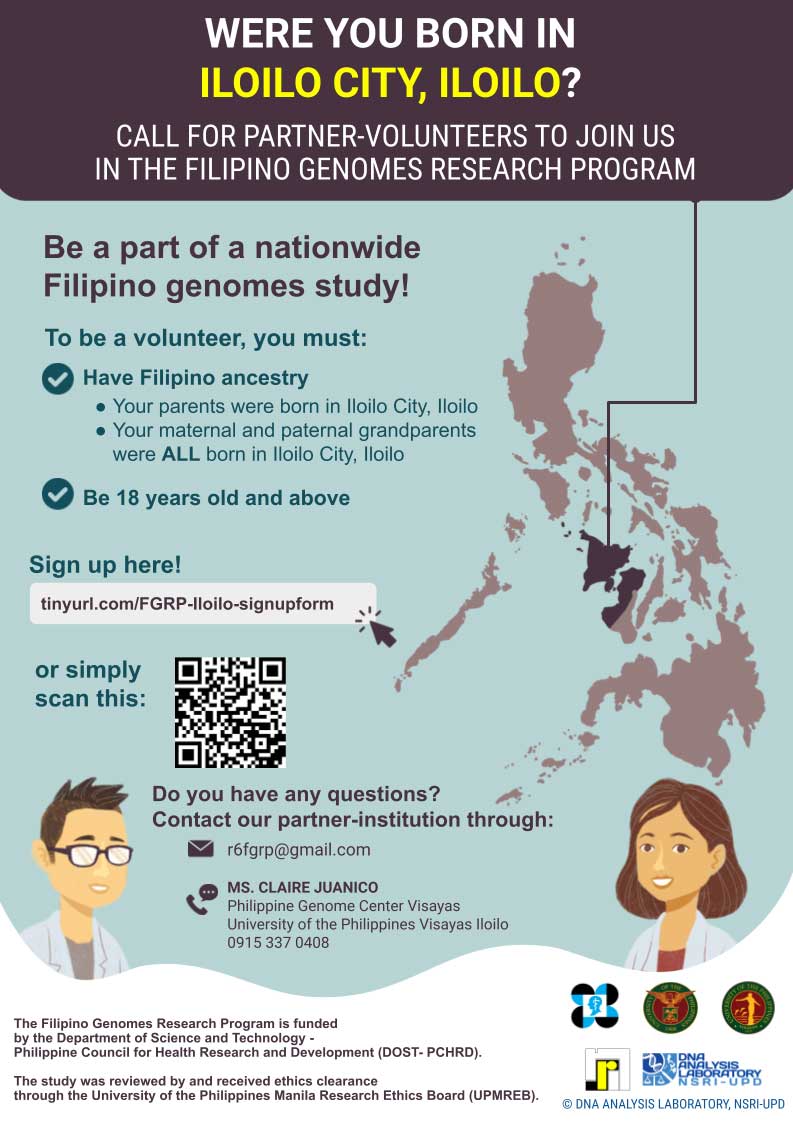The University of the Philippines Visayas through Philippine Genome Center Visayas is collaborating with the DNA Analysis Laboratory of the Natural Sciences Research Institute, University of the Philippines Diliman for the Filipino Genomes Research Program (FGRP): Representing the Underrepresented, a study funded by the Department of Science and Technology (DOST) and the Philippine Council for Health Research and Development.
The collaboration will involve two component projects of the program: Project 1 – Filipino Forensic Genomics and Project 2 – Filipino Genomes: History, Evolution, Origins, and Applications. FGRP aims to represent and involve Filipinos in human genomics research to make sure that the focus, output, applications, and benefits are relevant, transferable, and applicable to the Filipino population.
Designed to be participatory research, FGRP will recruit volunteers who will become partners in the study implementation. The research outputs have the potential to enhance the study of Filipino history, geography, health, and medicine and strengthen the use of forensic genetics in the Philippines.
The program intends to represent and involve various Filipino groups in human genomics research; document stakeholder appreciation of genomic concepts and research process; increase the scientific work force and expand research partnerships; and generate a DNA sample biobank and genome databank for Filipino genomics research.
Who can be partner-volunteers in this study?
Partner-volunteers should be a Filipino born in Iloilo City, Iloilo. They should be 18 years old and above. Preferably, both parents and all four grandparents of the partner-volunteers should have originated from Iloilo City as well. Partner-volunteers should not be related to any of the other volunteers, up to the degree of second cousins.
Volunteers may also participate in the study as a trio: father, mother, and child. It is also preferred that their parents and grandparents originated from Iloilo City.
The rights of the partner-volunteers will be protected and upheld all throughout the course of the study and beyond. Their rights include joining the study without paying, ask questions anytime throughout the duration of the study, change the storage options of their sample anytime, withdraw from participating in the study anytime without penalty, and be reimbursed for expenses (e.g., transportation) incurred to reach the study site.
The FGRP study was reviewed and approved by the University of the Philippines Manila Research Ethics Board (UPMREB). Questions and clarifications regarding the rights of partner-volunteers can be directed to Dr. Cecilia A. Jimeno, UPMREB Chair. Emails can be sent to [email protected].
The partner-volunteers who agree to participate in the study will go through a process, which will include an orientation, filling out of the consent form, interview, anthropometric measurements, and saliva collection. DNA processing and analysis will follow once the collection process if completed. The research team is committed to return to the community to present the results of the study before they are presented to the scientific community.
The personal, genealogy, and anthropometric information of the partner-volunteers will be used to study Filipino genetic variation for anthropology, forensics, and evolution.
Interested individuals may connect with Ms. Claire Juanico, FGRP research collaborator, who holds office at the Philippine Genome Center Visayas, UPV, Iloilo. An email can be sent to [email protected] to learn more about the study. (Ms. Gerthrode Charlotte Tan-Mabilog, IPO)


















